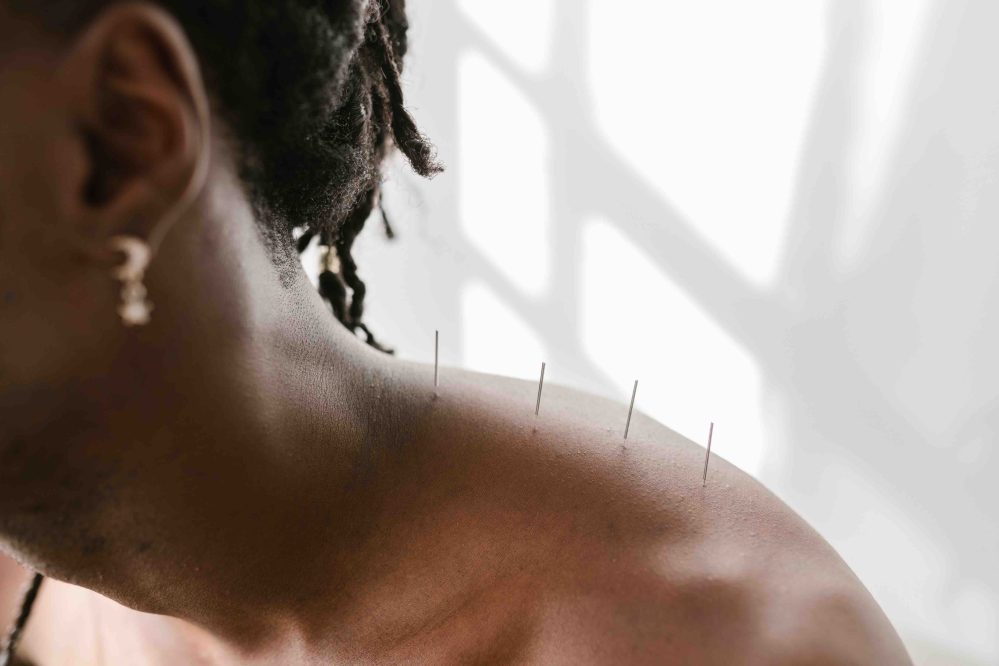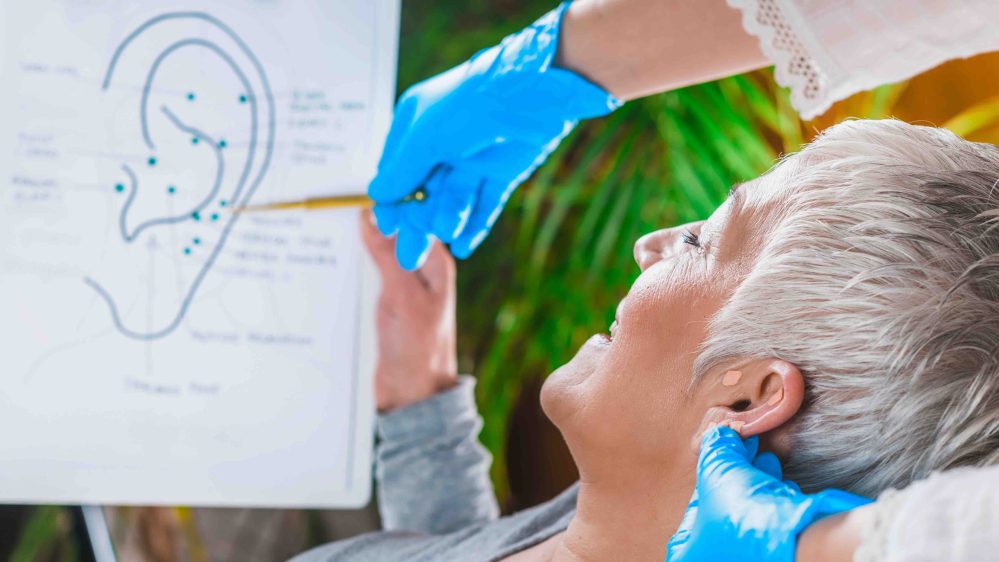Traditional Chinese medicine claims the human body has around 2,000 acupuncture points linked by channels or meridians. They allow energy (called Qi, pronounced “chee”) to flow through the body, which is responsible for overall health. They believe that a disruption of this energy can lead to many diseases.
This is where acupuncture comes into the picture. But what is acupuncture exactly? As a vital component of traditional Chinese medicine, acupuncture is most typically used to relieve pain and for overall mental wellness, including stress reduction.
AIAM has prepared this guide in hopes of answering your questions about acupuncture and helping you learn more about what acupuncture is good for and how acupuncture works to relieve pain.
What Is Acupuncture?
Acupuncture is an alternative treatment used by many practices, clinics, and hospices that involves inserting thin steel needles into the skin in order to stimulate sensory nerves and muscles. This could help treat chronic pain and other physical conditions. Occasionally, other forms of stimulation are preferred over needles, such as:
Heat (moxibustion)
Pressure (acupressure)
Friction
Suction (cupping)
Impulses of electromagnetic energy
How Does It Work?
Trying to describe how acupuncture works without seeming overly scientific is difficult. Acupuncture, in a nutshell, causes the body to release its own naturally existing painkillers and feel-good chemicals while also relaxing the nervous system.
Acupuncture can also enhance blood circulation and help the body relax. Acupuncture points have numerous channels that connect in specific areas of the body where there are multiple nerves. Numerous acupoints are located throughout the body, but only a few are known as major acupoints.
Different major acupoints serve as focal points for various health conditions. For example, the major acupuncture point in your hand is beneficial for headaches, body pain, or toothache. In contrast, the major acupoint on the back of your hand is beneficial for back pain and knee pain.
As a result, depending on what health issue you are trying to target, that is where the acupuncture practitioner will focus when performing acupuncture. Now that we understand how acupuncture works let’s see how this procedure is done.
What Can Acupuncture Be Used For?
There is a wide range of health conditions for which acupuncture can be used. Typically, acupuncture is considered a therapy option for:
Chronic (ongoing) pain
Headaches of chronic tension
Migraines
Dental pain
Joint pain
Postoperative pain
However, acupuncture is not limited to these health issues. Would you believe if we said that it could be effective for other health issues, like allergies, anxiety, and depression? Moreover, it is kid-friendly, so if you want to avoid antibiotics or other drugs for ear infections, constipation, allergies, and behavioral issues, acupuncture and non-needle techniques are safe and effective choices for your little ones.
Here are five other cases where acupuncture has had good results:
Seasonal allergies
Digestive complaints
Sciatic pain
Insomnia
Anxiety, stress, and depression
How Is Acupuncture Done?
Acupuncture is a procedure done in sessions that usually last up to 60 minutes. The number of treatments required will vary according to the condition being treated and its severity. In most cases, six to eight treatments are recommended. A typical treatment regimen for a single problem would include one or two weekly treatments.
Before starting the treatment, the acupuncturists will examine you more closely to identify the type of acupuncture therapy most beneficial to you. Next, 5 to 20 needles are placed at different depths at strategic spots on your body. After doing so, they might gently rotate or twirl the needles or use heat or electrical pulses to the needles.
Understandably, you might be concerned about the level of pain induced in acupuncture, especially if you are scared of needles. However, contrary to many myths about acupuncture being painful, there is no reason to be scared because the needles are hair-thin, and you will only feel slight pressure or discomfort. Some people might not even feel anything during the process.
Benefits of Acupuncture
If you’re thinking about getting acupuncture, you might be asking yourself, “Is acupuncture effective?” While the answer varies from person to person, acupuncture has been used to treat various health issues for years, and with good reason. Here are some benefits of acupuncture:
It can be effectively combined with other treatments.
It can help manage chronic pain, headaches, and migraine.
It has little to no side effects.
It can target numerous health concerns simultaneously.
Are There Any Risks?
Acupuncture is a delicate procedure because it involves needles. Incorrect needle insertion can result in pain during therapy. That is why it is critical to seek treatment from a licensed acupuncturist. Moreover, to avoid infection, it is vital to sterilize the needles beforehand. Like other medical devices and tools, acupuncture needles are regulated by the FDA (Food and Drug Administration) under good manufacturing practices and single-use sterility standards.
If you have a bleeding disease, such as hemophilia, a metal allergy, or an infection in the area where needles may be inserted, please seek your doctor’s approval before having acupuncture.
Although we could say that acupuncture’s risks are minimal, it does have some slight side effects, including slight bleeding, bruises, or soreness where the needles stand, and these typically dissipate within 24 hours.
Wrapping Up
Acupuncture has proven to be an excellent and effective procedure to help relieve body pain and treat many health issues. If you are here because you suffer from a certain condition and are hesitant to take the first step to reach out to an acupuncturist, know that this treatment has more benefits than risks as long as you take the right measures. On the other hand, if you are interested in furthering your education in this technique and becoming a licensed acupuncturist, check out our Masters of Acupuncture Degree program.

